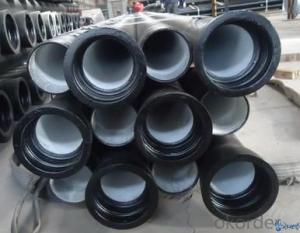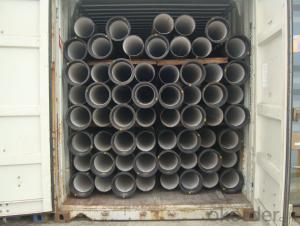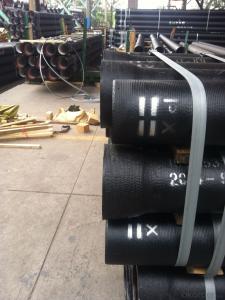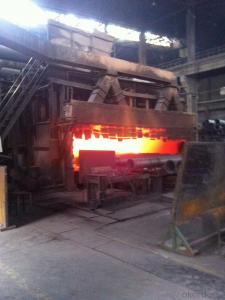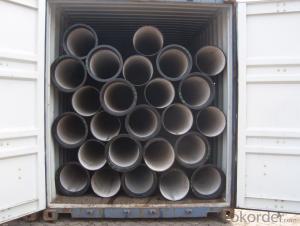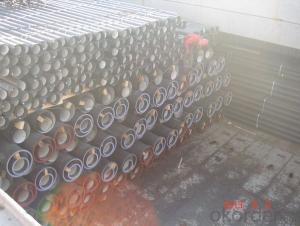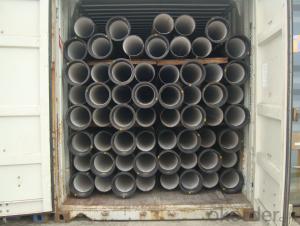DUCTILE IRON PIPES AND PIPE FITTINGS K8CLASS DN1000
- Loading Port:
- Tianjin
- Payment Terms:
- TT OR LC
- Min Order Qty:
- 22 pc
- Supply Capability:
- 3000 pc/month
OKorder Service Pledge
OKorder Financial Service
You Might Also Like
Material : Ductile Cast Iron
Size Range : DN 80mm to DN 2000mm
Unit Effective Length : 6m or 5.7m
Manufacture Standard: ISO 2531:1998/ EN 545:2006/EN 598:2007
Annual capacity : 200,000 tons
Coating Exterior: Zinc 130g/m2 according to ISO 8179-1 and bitumen coating 70 microns.
Cement Interior: Portland Cement/ High Alumina Cement/ Sulphate Resisting Cement Lining according to ISO 4179
Special requirements on external coating and internal lining can be applied
We also provide accessories such as SBR/EPDM rubber gaskets, lubricant paste, pipe caps, PE sleeves, etc.
Additional Parts:
Each pipe is strictly inspected according to related standard to ensure permanently high performance.
Easy Installation at site and service free for life
Long Service Lifespan
Quotation will arrive you within 24hours once we get your inquiry.
We guarantee offering you a competitive price.
A copy of original inspection reports of pipes will be offered after shipment.
Photos of loading process will be sent to the customer after shipment effect.
We will follow-up the delivery progress after shipment effect and update to the customer on weekly basis.
- Q: Are ductile iron pipes suitable for gravity sewer systems?
- Yes, ductile iron pipes are suitable for gravity sewer systems. Ductile iron pipes have high strength, durability, and flexibility, making them an excellent choice for underground sewer networks. They can withstand the pressure and weight of the soil above them, making them ideal for gravity flow systems where wastewater flows naturally due to gravity. Additionally, ductile iron pipes have a long lifespan and are resistant to corrosion, making them a reliable and cost-effective solution for gravity sewer systems.
- Q: How do ductile iron pipes handle thermal cycling in industrial applications?
- Ductile iron pipes are well-suited for handling thermal cycling in industrial applications. Due to their high thermal conductivity and low thermal expansion coefficient, they can effectively and safely withstand the stresses caused by repeated heating and cooling cycles. This makes them highly resistant to cracking, distortion, or other forms of thermal damage, ensuring their durability and reliability in industrial environments.
- Q: The benefits of ductile iron castings
- Nodular cast iron has developed rapidly to be second only to grey cast iron and widely used as cast iron material. The so-called "iron instead of steel", mainly refers to ductile iron
- Q: Are ductile iron pipes suitable for hydroelectric power plants?
- Indeed, hydroelectric power plants can benefit from the suitability of ductile iron pipes. Renowned for their robustness, endurance, and adaptability, ductile iron pipes prove to be an optimal selection for a variety of water industry applications, including hydroelectric power plants. These pipes exhibit the ability to endure substantial pressure and resist corrosion, thereby ensuring their appropriateness for the conveyance of water throughout the various stages of hydroelectric power generation. Moreover, the extended lifespan of ductile iron pipes and their minimal maintenance requirements effectively reduce the overall operational expenses associated with power plant maintenance. Consequently, ductile iron pipes emerge as a dependable and fitting choice for hydroelectric power plants.
- Q: Are ductile iron pipes more expensive than other pipe materials?
- Yes, ductile iron pipes are generally more expensive than other pipe materials such as PVC or HDPE. However, they offer superior strength, durability, and longevity, making them a cost-effective choice in the long run for applications that require high pressure or corrosive resistance. Additionally, ductile iron pipes have a lower life cycle cost due to their reduced maintenance and repair needs.
- Q: How is ductile iron pipe recycled?
- Ductile iron pipe is typically recycled through a process called reclamation. This involves collecting the used pipe, cleaning and removing any impurities, and then melting it down to form new ductile iron products. The recycled ductile iron can be used to manufacture various items such as new pipes, fittings, and construction materials, providing a sustainable and environmentally-friendly solution for its disposal.
- Q: Are ductile iron pipes suitable for irrigation canal systems?
- Yes, ductile iron pipes are suitable for irrigation canal systems. Ductile iron pipes have high strength and durability, making them resistant to external loads and pressure variations common in irrigation systems. They also have excellent corrosion resistance, ensuring a long lifespan and minimizing maintenance needs. Additionally, ductile iron pipes have smooth interiors, reducing friction and allowing for efficient water flow, which is crucial for irrigation canal systems.
- Q: Are ductile iron pipes resistant to chloride-induced corrosion?
- Yes, ductile iron pipes are generally resistant to chloride-induced corrosion due to their protective coating and inherent chemical composition. However, the level of resistance may vary depending on the specific environment and concentration of chlorides present. Proper maintenance and regular inspections are still important to ensure long-term durability and prevent any potential corrosion issues.
- Q: What is the typical diameter range of ductile iron pipes?
- The typical diameter range of ductile iron pipes is between 4 inches and 64 inches.
- Q: What is the minimum operating temperature for ductile iron pipes?
- The minimum operating temperature for ductile iron pipes is typically around -20 degrees Celsius (-4 degrees Fahrenheit).
Send your message to us
DUCTILE IRON PIPES AND PIPE FITTINGS K8CLASS DN1000
- Loading Port:
- Tianjin
- Payment Terms:
- TT OR LC
- Min Order Qty:
- 22 pc
- Supply Capability:
- 3000 pc/month
OKorder Service Pledge
OKorder Financial Service
Similar products
Hot products
Hot Searches
Related keywords
